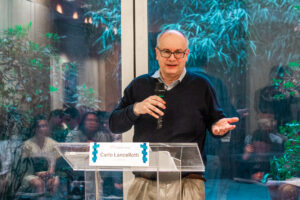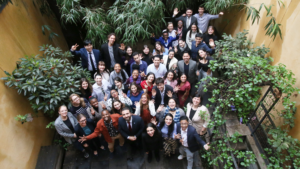April 25th, 2022, New York – This article was throughout the week, according to the developments at the Commission on Population and Development.
The 55th session of the Commission on Population and Development began this week. As of 1994, the CPD monitors, reviews and assesses the implementation of the Programme of Action of the International Conference on Population and Development at a national, regional and international level. The Commission is currently interested in subjects such as aging, youth, capacity development, family planning, fertility and marriage, international migration, mortality, population policies, population trends, SDGs and urbanization. The theme of this year’s conference is:
Population and sustainable development, in particular sustained and inclusive economic growth.
Monday, April 25th
- At the high level opening meeting the majority of speakers controversially talked about the importance of access to sexual and reproductive health and rights (which is not a right under international law) as well as shed a negative light on population growth. They discussed climate change, inequality, poverty, and health care. However, Professor Jayati Ghosh changed the tone of the conversation by saying that, “It is not too many people [that is the problem], it is how we have done our social and economic arrangements across the globe.”
 The following meetings included statements from country representatives as well as an interactive debate. In general, population growth was represented as something negative, with its effects being poverty, pollution and carbon emissions. However, some speakers noted that people need to be at the center of policies and strategies. Mr. Hugh Hilton Todd mentioned that urbanization can be a powerful tool in dealing with population growth, and that expanding the affordable housing sector is extremely important.
The following meetings included statements from country representatives as well as an interactive debate. In general, population growth was represented as something negative, with its effects being poverty, pollution and carbon emissions. However, some speakers noted that people need to be at the center of policies and strategies. Mr. Hugh Hilton Todd mentioned that urbanization can be a powerful tool in dealing with population growth, and that expanding the affordable housing sector is extremely important. - Education was also a topic of discussion, particularly how providing this to women and girls has the effect of making it less likely that they marry early and of them having fewer children. Prof. Ghosh stated that providing education should not focus on fertility goals. “The main reason [for women’s education] is that if we do not empower women, we are unable to deal with the major challenges facing humanity.”
Tuesday, April 26th
- Many speakers mentioned the “demographic dividend,” referring to the economic opportunity in the fact that over half of the population in many developing countries is under 30 years old.
- In a side event organized by the Permanent Mission of the State of Qatar, Dr. Luay Shabeneh noted that often the choice of a woman to raise her children is not one that is valued. It does not have the same esteem as going to work, nor is it valued by the economy.
Wednesday, April 27th
- In a side event on the opportunities and challenges of living longer, speakers touched on the fact that the number of people 80 or older will triple between 2030 and 2050. They discussed the need for participatory aging (including the elderly in decision-making processes) and the importance of promoting good physical and mental health. According to the representative of Slovenia, “A stronger protection and promotion of human rights and the dignity of older persons needs to become a part of the paradigm shift in our recovery efforts. It’s a key to building a more equal and age-friendly society and thus fulfilling our promise of leaving no one behind.”
- In an expert panel on the priority theme, one speaker addressed the fact that so many people rely on informal jobs with no social protection. This “shadow” economy is THE economy for a great majority. This is a problem to be tackled for inclusive economic recovery post COVID-19.

Thursday, April 28th
- In an expert panel and interactive dialogue, China spoke about the challenges of having a large population, especially the strain on the environment and resources. With a fertility rate of 1.3, this country is nearing a “zero growth rate,” yet it is trying to reverse this trend by providing incentives to couples to have two or three children.
- WYA delivered a statement in the afternoon, calling for member states to recognize that human beings are the world’s most precious resource. Therefore, to promote a world where sustainable and inclusive economic growth can be reached post-COVID-19, we proposed that states focus on investing human dignity education (in particular the Human Dignity Curriculum), family friendly policies and a person-centered economy.
Friday, April 29th
- Member states accepted the CPD55 outcome document, most claiming that it was a balanced outcome as many compromises had been made during negotiations. Nevertheless, many were obliged to accept the document with reservations. They included Saudi Arabia, Bahrain, Kuwait, Oman, the UAE, Qatar, Iraq, Egypt, Iran, Guatemala, Yemen, Nicaragua, Russia and the Holy See. Most noted that, as stated in this document’s operational paragraph 2 as well as the 1994 Programme of Action of the International Conference on Population and Development, they as states are not entitled to implement any part of this document that is not in line with their national legislation. Russia lamented that all language on the family was removed from this document and encouraged this to be rectified next year, where the theme will be “Population, education and sustainable development.”
To view country and NGO statements, meeting summaries and video links, as well as the final CPD55 Resolution visit the official 55th session of the Commission on Population and Development webpage.







